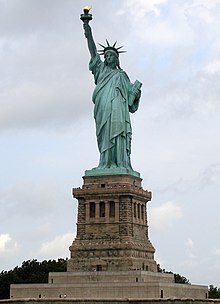American exceptionalism

American exceptionalism is the belief that
- the US is unique and special[2]
- the US has a unique mission to transform the world
- the US is superior to other nations because of its unique history and mission
Unique nation[change | change source]
The US started from the American Revolutionary War. Martin Lipset calls it the "first new nation".[3] It developed an American set of ideas (Americanism) based on republicanism, democracy, laissez-faire (no government interference in economy), liberty, equality, individualism (importance of individual).[4]
Unique mission[change | change source]
Abraham Lincoln said in the Gettysburg address (1863), that Americans have a responsibility to make sure that the "government of the people, by the people, for the people, shall not perish from the earth."
Related pages[change | change source]
- American decline
- American imperialism
- Americanism (ideology)
- Americanization
- Americentrism
- Anti-Americanism
- Juche (nationalist North Korean state ideology)
- Sonderweg (German exceptionalism)
- Yamato-damashii (Japanese spirit)
- Nihonjinron (Japanese uniqueness)
References[change | change source]
- ↑ Winfried Fluck; Donald E. Pease; John Carlos Rowe (2011). Re-framing the Transnational Turn in American Studies. University Press of New England. p. 207. ISBN 9781611681901.
- ↑ American Exceptionalism: A Double-Edged Sword. Seymour Martin Lipset. New York, N.Y.: W.W. Norton & Co., Inc. 1996. p. 18. .
- ↑ Seymour Martin Lipset, The first new nation (1963).
- ↑ Lipset, American Exceptionalism, pp. 1, 17–19, 165–74, 197
